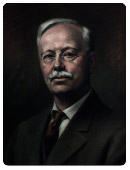Former justices

Justice Charles H. Crownhart
Wisconsin Supreme Court Justice: 1922–1930Life: 1863–1930
"In Crownhart's own words, he believed that the trend of government 'has been to secure more freedom, a greater security of property and person, more education, more of the comforts of life and the preservation of the rights of conscience'." – Edward J. Dempsey, Crownhart's memorial service (1930)
Charles Henry Crownhart was born on April 16, 1863, in New Castle, Wisconsin. He graduated from River Falls Normal School in 1886 and received a law degree from the University of Wisconsin Law School in 1889.
In 1891, Crownhart moved to Superior to start a law firm with Walter C. Owen (who later became a Wisconsin Supreme Court justice). While practicing law for 20 years, Crownhart served as Douglas County district attorney and was a member of the Board of Regents of Normal Schools.
Crownhart was the principal draftsman of the first Workmen's Compensation Act which was enacted in Wisconsin in 1911. Prior to this legislation, there was no statutory compensation for work-related injuries and common claims for damages for such injuries flooded the courts. Crownhart was then appointed chair of Wisconsin's first Industrial Commission. He worked with John R. Commons and Joseph D. Beck to administer the act.
Crownhart, a close friend and advisor to U.S. Senator Robert M. La Follette, was active in the Wisconsin Progressive movement. In 1910, Crownhart managed La Follette's first congressional campaign.
In 1921, the state Supreme Court appointed Crownhart the revisor of statutes. A year later, Governor John J. Blaine appointed him to the Supreme Court and he won election soon after.
The Dane County Bar said of Crownhart: "He was no believer of a cloistered judiciary. He saw the judiciary as but an agency of democracy, an agency that must be ever in touch with the people and with the progress of human institutions, to perform aright its functions."
Crownhart and his wife Jessie Evans had two sons, Jesse and Charles.

